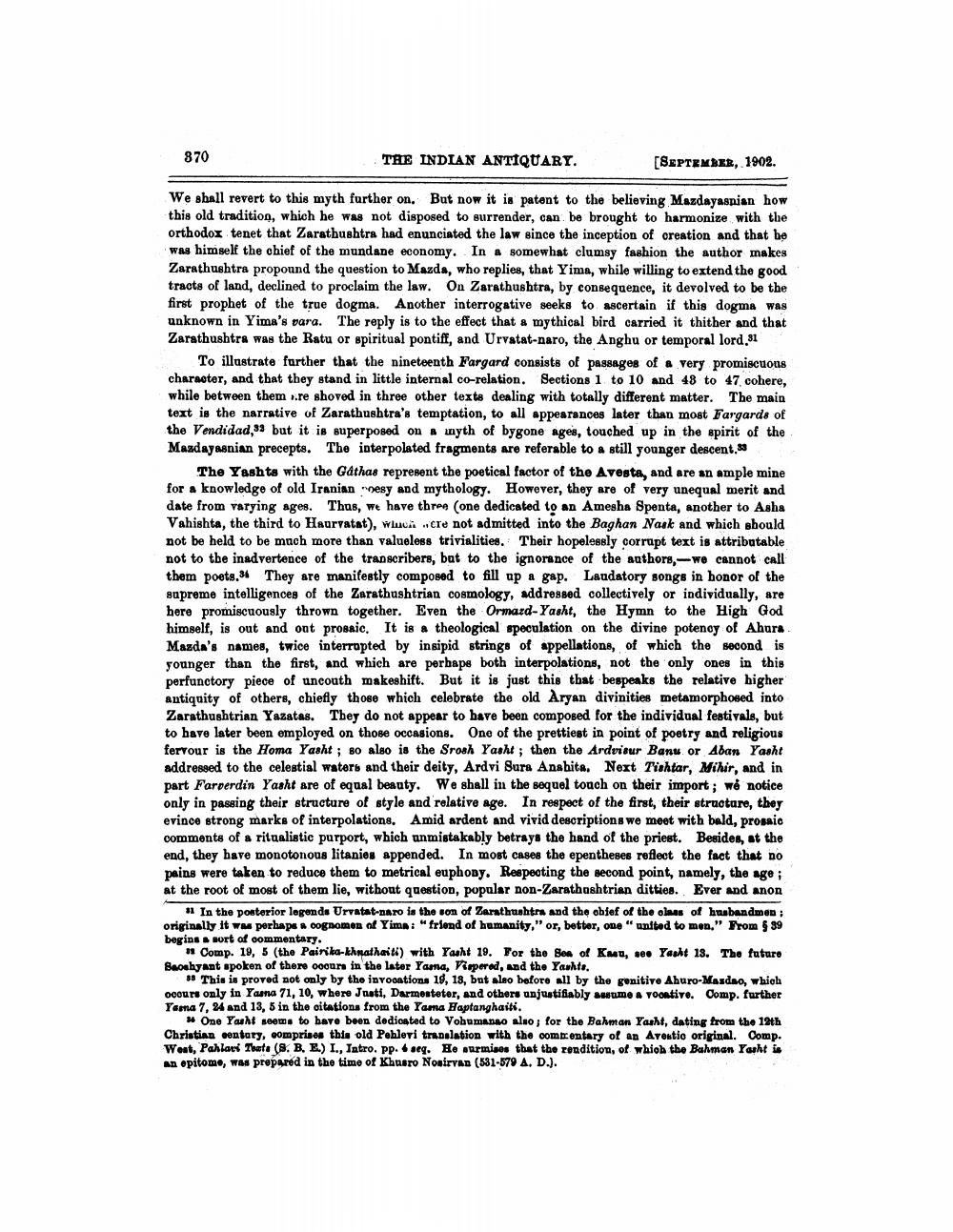________________
870 THE INDIAN ANTIQUARY.
[SEPTEMBER, 1902.
- We shall revert to this myth further on. But now it is patent to the believing Mazdayaspian how this old tradition, which he was not disposed to surrender, can be brought to harmonize with the orthodox tenet that Zaratbushtra had enunciated the law since the inception of creation and that he was himself the chief of the mundane economy. In a somewhat clumsy fashion the author makes Zarathushtra propound the question to Mazda, who replies, that Yime, while willing to extend the good tracts of land, declined to proclaim the law. On Zarathushtra, by consequence, it devolved to be the first prophet of the true dogma. Another interrogative seeks to ascertain if this dogma was unknown in Yima's vara. The reply is to the effect that a mythical bird carried it thither and that Zarathushtra was the Ratu or spiritual pontiff, and Urvatat-naro, the Anghu or temporal lord,81
To illustrate further that the nineteenth Fargard consists of passages of a very promiscuous character, and that they stand in little internal co-relation. Sections 1 to 10 and 48 to 47 cohere, while between them .re shoved in three other texts dealing with totally different matter. The main text is the narrative of Zarathushtra's temptation, to all appearances later than most Fargards of the Vendidad,33 but it is superposed on a myth of bygone ages, touched up in the spirit of the Mazdayasnian precepts. The interpolated fragments are referable to a still younger descent.53
The Yashts with the Gathas represent the poetical factor of the Avesta, and are an ample mine for a knowledge of old Iranian "esy and mythology. However, they are of very unequal merit and date from varying ages. Thus, we have three (one dedicated to an Amesha Spenta, another to Asha Vahishta, the third to Haurvatat), wuch .cre not admitted into the Baghan Nask and which should not be held to be mach more than valueless trivialities. Their hopelessly corrupt text is attributable not to the inadvertence of the transcribers, but to the ignorance of the authors, we cannot call them poets. They are manifestly composed to fill up a gap. Laudatory songs in honor of the supreme intelligences of the Zarathushtrian cosmology, addressed collectively or individually, are here promiscuously thrown together. Even the Ormazd-Yasht, the Hymn to the High God himself, is out and ont prosaic. It is a theological speculation on the divine potency of Ahura Mazda's names, twice interrupted by insipid strings of appellations, of which the second is younger than the first, and which are perhaps both interpolations, not the only ones in this perfunctory piece of uncouth makeshift. But it is just this that bespeaks the relative higher antiquity of others, chiefly those which celebrate the old Aryan divinities metamorphosed into Zarathushtrian Yazatas. They do not appear to have been composed for the individual festivals, but to have later been employed on those occasions. One of the prettiest in point of poetry and religious fervour is the Homa Yasht ; 80 also is the Srosh Yasht; then the Ardviour Banu or Aban Yasht addressed to the celestial waters and their deity, Ardvi Sura Anahita. Next Tishtar, Mihir, and in part Farperdin Yasht are of equal beauty. We shall in the sequel touch on their import; we notice only in passing their structure of style and relative age. In respect of the first, their struotare, they evince strong marks of interpolations, Amid ardent and vivid descriptions we meet with bald, prosaic comments of a ritualistic purport, which unmistakably betrays the hand of the priest. Besides, at the end, they have monotonous litanies appended. In most cases the epentheses reflect the fact that no pains were taken to reduce them to metrical euphony. Respecting the second point, namely, the age ; at the root of most of them lie, without question, popular non-Zarathashtrian ditties. Ever and anon
11 In the posterior legends Urvatat-naro is the son of Zarathustra and the chief of the olass of husbandmen: originally it was perhaps & cognomen of Yima: " friend of humanity," or, better, one "united to men." From $99 begins sort of commentary.
Comp. 19, 5 (the Painika-khnathaill) with Yasht 19. For the son of Kmu, seYasht 13. The futuro Baoshyant spoken of there cour in the later Yamna, Vispered, and the Yashte.
88 This is proved not only by the invocations 18, 18, but also before all by the genitive Ahuro-Masdao, which ocouri only in Yasna 71, 10, where Justi, Darmenteter, and others unjustifiably assume a voontive. Comp. further Tema 7, 24 and 13, 5 in the citations from the Yama Haptanghaits.
One Yasht seems to have been dedicated to Vobumanao alho; for the Bahman Yasht, dating from the 19th Christian sentary, comprises this old Pehlevi translation with the commentary of an Aventio original. Comp. West, Pahlavi Teata (8. B. E.) I., Intro. Pp. 6 seg. He surmises that the condition, of which the Bahman Yosht is an epitome, was prepared in the time of Khusro Nosirvan (531-579 A, D.).




